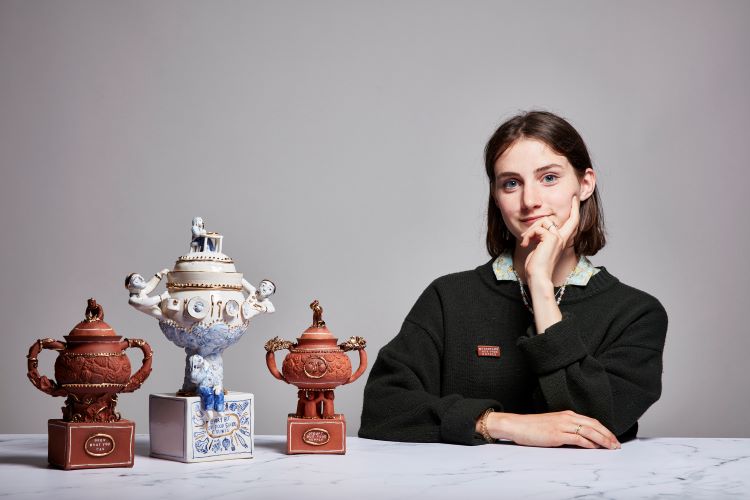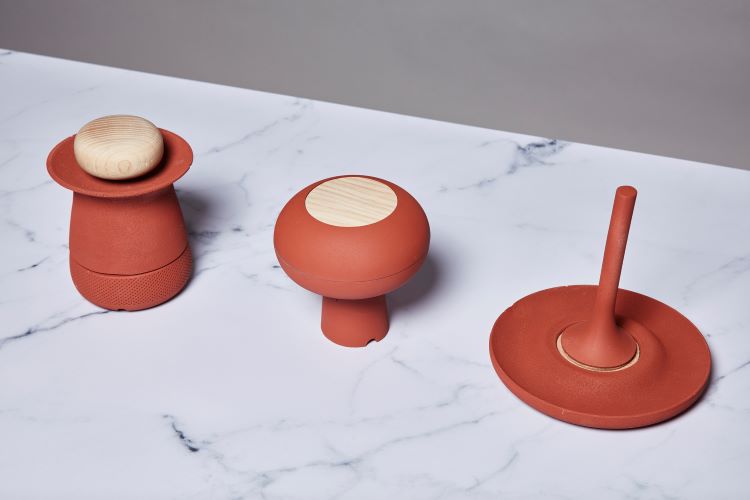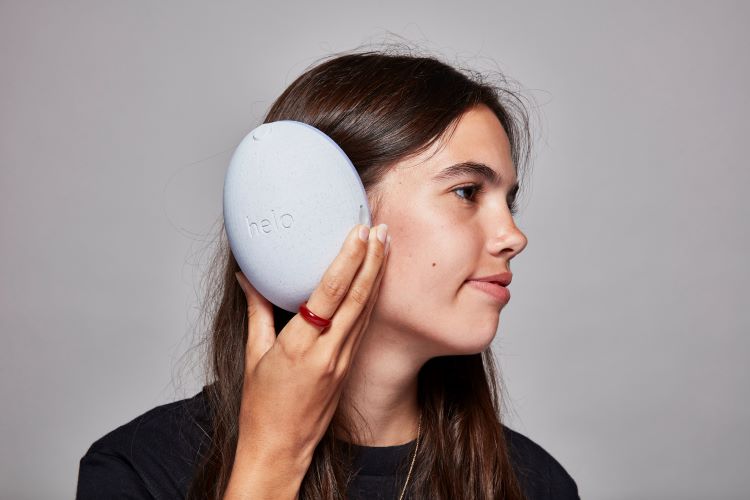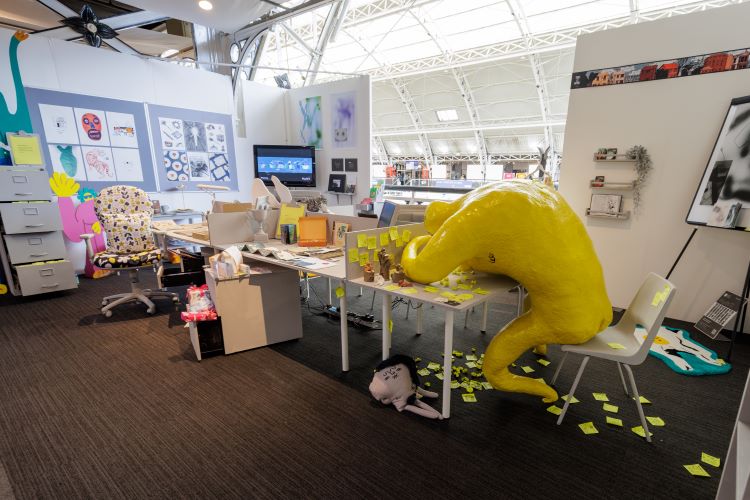
Self-help graphic design project takes top award at New Designers 2023
An at-home cervical screening product, mushroom-leather shoes, and a bench designed to encourage socialising also won awards.
New Designers has announced the winners of its 2023 awards programme, with a graphic art self-help book designed to appeal to the five senses taking one of the top accolades.
The design fair runs for two weeks showcasing 3000 design and innovation projects completed by recent graduates from the UK. Designers working in textiles, fashion and costume, ceramics, contemporary design, craft and jewellery present in week one. Week two features work from designers working in furniture, product design, industrial & spatial design, graphic design, illustration and animation, and motion and digital arts disciplines.
Prizes differ depending on the award, with some winners taking home a cash prize and others winning paid internships or mentoring.
New Designers of the Year Award
Northampton University Graphic Communication Design graduate Tabitha Dudley. Credit: Mark Cocksedge
The New Designers of the Year Award is the highest accolade in the programme, indicated by a £1250 cash prize. Northampton University Graphic Communication Design graduate Tabitha Dudley took home the award for her design of a 220-page graphic art self-help book, which looks to move away from traditional wellness tropes.
Each of the chapters is dedicated to one of the five senses and contains interactive text as well as QR codes that lead to webpages and animations also designed by Dudley. It aims to help readers articulate themselves during tough times.
The second New Designers of the Year Award went to Falmouth University’s Beth Somerville, who designed two textile collections that experimented with modern techniques. One was a process-led fabric collection inspired by mountains while the other utilised digital embroidery.
 Loughborough University Industrial Design and Technology graduate Ellen Callaghan. Credit: Sam Frost
Loughborough University Industrial Design and Technology graduate Ellen Callaghan. Credit: Sam Frost
Runners-up for the award were Loughborough University Industrial Design and Technology graduate Ellen Callaghan, who created an at-home cervical screening tool in a bid to encourage more women get regular screenings, and Hereford College of Arts’ Joe Shevelan with his collection of hand-forged rocks, which are also wearable jewellery. Each runner-up won a £700 cash prize for their projects.
Callaghan’s project also won the Anglepoise Abandon Darkness Award, which includes a £500 cash prize, mentorship and an Anglepoise lamp.
The Habitat Future Design Award
 Sheffield Hallam University’s Harvey McKellar’s winning project. Credit: Sam Frost
Sheffield Hallam University’s Harvey McKellar’s winning project. Credit: Sam Frost
Sheffield Hallam University’s Harvey McKellar created a park bench that aims to be more than a functional or decorative furniture piece by having a positive impact on mental health. It is a subject he is especially passionate about, as he experienced a suicide in his family in his teens.
The design employs 25-degree-angles which mean users can see each other in their peripheral vision. It is intended to encourage conversation and combat feelings of loneliness.
An interiors collection designed for an Agatha Christie-inspired café by Nottingham Trent University’s Millie Farley also won a Habitat Future Design Award. Both winners will benefit from a six-month paid placement at the Habitat studio.
Creative Conscience & New Designers Ethical Makers’ Award
 Bath School of Design Furniture and Product graduate Rosie Lee Hood. Credit: Mark Cocksedge
Bath School of Design Furniture and Product graduate Rosie Lee Hood. Credit: Mark Cocksedge
Seeking to spotlight the versatility and natural beauty of wool, Bath School of Design Furniture and Product graduate Rosie Lee Hood designed and made three lamps with woollen shades. Her motivation was to combat the fact that wool has become less desirable and valuable over the last 50 years, costing less per kilo that it costs to farm it.
Judges described them as “beautifully made products”, adding that they “love its local focus” and recognise the project’s potential to “expand and create a sustainable and profitable business”.
 Manchester School of Art’s Martha Wiles. Credit: Mark Cocksedge
Manchester School of Art’s Martha Wiles. Credit: Mark Cocksedge
Manchester School of Art’s Martha Wiles also took home the award for her project Regenerative Appetite. It comprises a collection of ceramic trophies and medals, each dedicated to a different food waste organisation in Manchester for which she has volunteered, aiming to raise awareness of food waste issues.
Hood and Wiles will have access to Creative Conscience’s Creative Impact Programme worth £1000, eight weeks of online training from design industry experts and live mentorship support with a social or environmental impact project for three months.
The Affinity Digital Design Award
 Nottingham Trent University graduate Anna Elias’ winning project. Credit: Mark Cocksedge
Nottingham Trent University graduate Anna Elias’ winning project. Credit: Mark Cocksedge
A project called Mellea by Nottingham Trent University graduate Anna Elias won the Affinity Digital Design Award. Elias created a range of sustainable walking shoes made from sustainable mushroom leather, as well as the bespoke branding for it.
The project’s name comes from the Latin name for honey fungus, Armillaria, , referencing the mushroom material. Judges said it was a “cohesive and comprehensive body of work with a clear visual voice and very professional standard already”.
The prize includes a MacBook Air, Affinity software and £1000 in cash.
DCA Futures Award
 Northumbria University graduate Gruff Jones’ project. Credit: Mark Cocksedge
Northumbria University graduate Gruff Jones’ project. Credit: Mark Cocksedge
Northumbria University’s Gruff Jones designed and made a set of three products – a thermostat, smart assistant and light controller – that aim to disrupt the smart tech category. With understated design at the heart of the concept, Jones made the products out of terracotta and incorporated features that look to encourage more emotive interaction.
For example, to warm your home you would cup your hands around the thermostat. Judges noted his “clever use of materials and unique interaction”.
Jones took home a £1000 cash prize.
Other winners
 Bournemouth University graduate Jake Leach-Perry’s project. Credit: Mark Cocksedge
Bournemouth University graduate Jake Leach-Perry’s project. Credit: Mark Cocksedge
A water bottle designed to melt, store and filter snow to help counter dehydration during outdoor alpine activity won the Joseph Joseph Brilliantly Useful Design Award. It was designed by Bournemouth University’s Jake Leach-Perry, who will get a three-month paid internship at Joseph and a £500 voucher for the brand.
 Loughborough University graduate Imogen Bags’ project. Credit: Mark Cocksedge
Loughborough University graduate Imogen Bags’ project. Credit: Mark Cocksedge
Loughborough University’s Imogen Bags won the Joseph Stannah Award for her ear-piercing aftercare device Helo, which aims to reduce the chance of infection. Bags took home a £1000 cash prize.
Seeking to make slow consumption more achievable and relieve shopping stress, Edinburgh Napier University’s Anna Hardie designed app Tabs. It used RFID (Radio-frequency Identification) tech to create a food tracking system that lets consumers make shopping lists and recipes based on food they already have in their home.
 Nottingham Trent University’s stand. Credit: Sam Frost
Nottingham Trent University’s stand. Credit: Sam Frost
Nottingham Trent University won the Best Stand Award for its “innovative idea behind the layout of the stand, really fun ideas and great work”, according to judges.
See details of the rest of the winning projects on the New Designers website.
Banner and featured image credit: Sam Frost.







